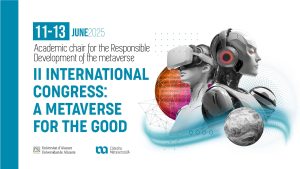
The MetaverseUA Chair Newsletter #6 - February 2024
Welcome to a new number of the MetaverseUA Chair Newsletter. February comes full of novelties in the scientific publications regarding the Metaverse. Buckle up! Let´s go to it.

EU Calls!
The European Commission has issued a call for contributions on Competition in Virtual Worlds and Generative AI. Following their communication on the EU Initiative on Web 4.0 and Virtual Worlds, the interest on the regulation of virtual worlds has increased. The objective of the European Commission is to gather expertise from the private sector and civil society, in order to set the regulatory priorities right. The impact of the Virtual Worlds in digital economy is undeniable. However, it is yet to be determined in scope and extension. The EU Institutions are trying to ride the wave and not lose themselves in the new business model and markets.
The European Commission already points at some risks on the markets side of the Virtual Worlds in its call for contributions. Network effects, lack of multi-homing, and “tipping” are some of them. We know fully well some of these risks from previous experience in social media. The network effect would see people trapped in a specific virtual world, unwilling to leave to a different one, simply because their friends are present at that one. Interoperability and a healthy competition environment could help reducing this risk.
This prospective analysis aims at mitigating those risks in the regulation. The EU Commission will gather the input from stakeholders until 11 March 2024. They intend to publish all the relevant contributions received on their website(s), similarly to previous formats. Meaningful and impactful input is expected. Therefore, a workshop with relevant stakeholders will follow, to discuss these issues further building on the responses to the consultation.

Could Leonardo have done also Metaverse? Pure digital Renaissance
We obtained some interesting insight on the governance side of the Metaverse by reading the new issues of Renaissance Numérique. We want you to share the wisdom too. This European think-tank has developed some interesting work by gathering experts in a series of workshops in Paris and Brussels. The workshops consisted on a series of one-day events for discussion and networking called ¨Metaverse Dialogues¨.
Renaissance Numérique has gathered the outcome of the events in a publication, issued in November 2023: “Governing the Metaverse and tomorrow´s Internet”. Insightful discussions and exchanges around the three main topics of their workshops: “Collective Narratives, affordance and use cases”, “Economics of the human body and avatars in the Metaverse” and “Data, Privacy, Identity: Potential legal changes”. We were glad to find among the persons interviewed for the report Michaela Mantegna, member of our Scientific Committee.
The main outcome of their dialogues is a key message: the Metaverse is an opportunity to gather together and fix some problems that have been around digital technology since the dawn of the Internet era. Experts and technicians all around the world are craving for regulation. For clear regulation that set things right in terms of consistency, international standards and interoperability. The Metaverse is a discussion on how we want the Internet to look like in the future. At a technical level, the Metaverse will probably never exist. But a number of Metaverses will. Meaning an array of interoperable and connected virtual worlds.

Parliament in a digital world
The European Parliament passed in January 2024 a political resolution on Virtual worlds – opportunities, risks and policy implications for the single market. The political debate follows the communication on the EU Initiative on Web 4.0 and Virtual Worlds issued by the European Commission at the end of 2023. It was a resolution from the Plenary, voted following a statement by the rapporteur from the European People´s Party Pablo Arias Echeverria. Although the initiative can be regarded as widely supported in a horizontal way from many different political groups of the European Parliament. Thus, considering the result of 484 votes in favour (PPE, Renew, S&D, The Left, the Greens and NI), 98 abstentions (mostly ECR and ID members of the EU Parliament) and only 45 votes against the motion (mostly ECR, but also individual MEPs from other political groups).
The resolution lays mostly on the consumer´s and citizens´ perspective, as it is a tradition in most of the political positioning of the EP about digital markets. It mostly welcomes the initiative of the European Commission to regulate the Metaverse following its recent efforts. As well as the effort to encapsulate one definition that can fit all virtual worlds. It notes, however, a critical distinction with different technologies involved in the Metaverse development that should come from industry, not from the EU regulators.
Internal market, consumer protection and sustainability are key points for the European Parliament in this matter. It notes the need for strong enforcement regarding virtual worlds with the recently passed digital regulations of the digital market: Digital Services Act (Regulation (EU) 2022/2065(1)), the Digital Markets Act (Regulation (EU) 2022/1925(2)), and the Data Act (2022/0047(COD)). Some focus is pointed at the weakness of consumers when semi-monopolistic providers dominate the digital environment, which also affects the Metaverse. Finally, sustainability issues are on the discussion also, connected to the production of hardware to support the digital worlds, both at industry and consumer level.

Don´t call the cops! Just yet
Interpol has published a White paper on the Metaverse as a law enforcement tool. The Lexipol Media group reports on the publication. The paper develops important concepts about virtual worlds such as use cases, crime, forensics, investigation, and governance. The international organisation aims at impulsing the use of immersive technologies as a training tool for agents.
The report also examines the criminal side, by touching upon some of the dark topics related crime in the Metaverse, such as nonfungible token fraud, cyber-physical attacks, impersonation by theft of digital identities, theft of 3D property and digital assets, the grooming of children, and stalking and sexual harassment. The goal is to set international standards and priorities in the sharing of information through the various platforms that Interpol operates, in order to help tackle trans-national crime. Collaboration in this matter between law enforcement agencies has grown exponentially. But also criminals are in the race.
Remember our Call for Papers for the I International Congress that we’ll be hosting in June on the responsible development of the Metaverse. If you have any appealing proposals, we strongly encourage you to send them our way (deadline: 28 February 2024, but probably will be extended).
Enjoy the ride!
Latest news & events
-
 14 Nov 2025 NewsMetaverseUA Chair Newsletter #22 – November 2025
14 Nov 2025 NewsMetaverseUA Chair Newsletter #22 – November 2025 -
 24 Oct 2025 NewsMetaverseUA Chair Newsletter #21 – October 2025
24 Oct 2025 NewsMetaverseUA Chair Newsletter #21 – October 2025 -
 28 Jul 2025 NewsHit play: Recordings from the II International Congress now available!
28 Jul 2025 NewsHit play: Recordings from the II International Congress now available! -
 28 Jul 2025 Activity logII International Congress: A Metaverse for The Good Part II: EspañaXR - Tecnologías inmersivas, emprendimiento y políticas públicas
28 Jul 2025 Activity logII International Congress: A Metaverse for The Good Part II: EspañaXR - Tecnologías inmersivas, emprendimiento y políticas públicas -
 28 Jul 2025 Activity logII International Congress: A Metaverse for The Good Part I: II EMRN Conference – “Exploring the Intersection of AI and the Metaverse”
28 Jul 2025 Activity logII International Congress: A Metaverse for The Good Part I: II EMRN Conference – “Exploring the Intersection of AI and the Metaverse”


